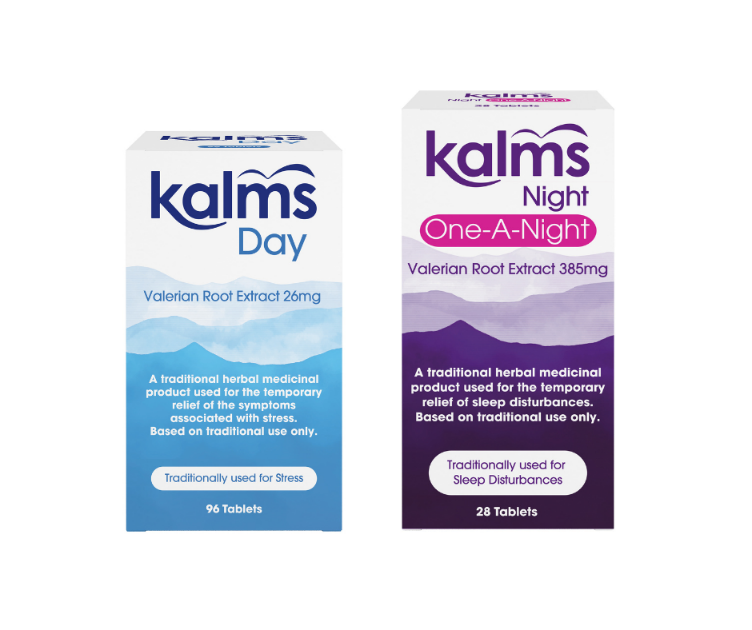“A Perfect Storm for Sleeplessness”: GP Shares Tips to Help 9 in 10 Menopausal Women Affected by Sleep Issues
- Raemona

- Aug 10
- 4 min read

A new survey has revealed the dramatic toll menopause takes on sleep, with 90% of peri- and menopausal women reporting disturbed nights, and 81% experiencing full-blown insomnia. [i] GP with a special interest in menopause and lifestyle medicine, Dr Rosie Khan, is urging action, offering practical advice and guidance to help women reclaim their rest.
Commissioned by Kalms Herbal Remedies, the nationally representative survey of 1,000 peri- and menopausal women highlights the growing toll menopause takes on sleep and overall wellbeing.
Almost a quarter (23%) report struggling to sleep every night, and nearly one in five (18%) experience insomnia daily. The impact goes far beyond tiredness: 68% say poor sleep increases their stress and anxiety – which in turn makes it even harder to rest, trapping many women in a state of constant fatigue and tension.
Key findings include:
Nearly three quarters (72%) noticed a decline in sleep quality since entering perimenopause or menopause
70% rarely get more than six hours of uninterrupted sleep; 72% wake feeling groggy even after a full night
68% feel tired most of the time, with 57% regularly relying on naps just to get through the day
36% say poor sleep is straining their relationships, with 46% choosing to sleep separately from their partner to avoid disruptions
37% rely on sugary snacks, caffeine or energy drinks for a daily boost – a coping mechanism that can ultimately worsen symptoms
// Why the menopause disrupts sleep
Dr Rosie Khan explains that hormonal changes during menopause are closely linked to disrupted sleep patterns:
“As levels of oestrogen and progesterone decline, they can interfere with the body’s internal clock, known as the circadian rhythm, and disrupt the production of key neurotransmitters like serotonin and melatonin, both of which help regulate sleep. This can make it harder to fall asleep and stay asleep. While hot flushes and night sweats are well-known culprits, many women also experience insomnia, low mood and fatigue even without these symptoms, creating a perfect storm for restless nights.”
// Seeking support and safe solutions
The study also highlights the impact of poor sleep on physical wellbeing, with 57% of women reporting associated health issues such as headaches, high blood pressure, and other symptoms.
Around 1 in 10 women (13%) said they had been prescribed medication for sleep, including Z-drugs or melatonin. However, many remain cautious about relying on medication long-term: 47% expressed concerns about potential side effects, and 51% were uneasy about the extended use of such treatments.
Instead, a growing number are exploring alternative approaches. Nearly half (44%) have tried non-prescription remedies or supplements, while 23% said they had stopped taking prescribed medication altogether, preferring more natural or holistic ways to manage their sleep.
With many women struggling to break the cycle of sleepless nights and rising stress, Dr Khan offers simple yet effective strategies to help support more restful sleep during this challenging life stage.
// Dr Khan’s tips for restful menopausal sleep
Create a sleep-positive environment
“Setting the right environment can have a powerful impact on your ability to fall, and stay, asleep. Dim the lights an hour before bed to encourage melatonin production, the hormone that supports sleep. Leave phones and other electronic devices outside the bedroom, as the blue light they emit can interfere with your body’s natural sleep-wake rhythm and hinder rest. Instead, make your bedroom a calm, clutter-free space. Keep it cool, dark and quiet, and opt for breathable bedding and pyjamas to help ease discomfort from hot flushes and promote uninterrupted sleep.”
Rethink evening habits
“Establishing healthy habits in the evening can make a big difference to how well you sleep. Avoid rich, sugary or spicy foods, as well as caffeine and alcohol, in the hours before bed, as these can all interfere with your ability to drift off. A warm bath with lavender-infused bubbles can help soothe muscle tension and calm a busy mind, while unwinding with a good book, rather than scrolling on your phone, can ease you into a more restful state.”
Unwind your mind
“Stress and anxiety are major disruptors of sleep, so it’s important to find ways to calm your mind before bed. If you find yourself lying awake with racing thoughts, consider incorporating a relaxation technique. One effective method is deep breathing, try the box breathing technique: inhale for four seconds, hold your breath for four, exhale for four, and hold again for four seconds before repeating the cycle. This simple exercise can help activate your parasympathetic nervous system, inducing a state of calm and helping you to relax.”
Consider natural remedies
“Some women explore natural remedies to support their sleep, such as valerian root or lavender oil. There is some evidence suggesting that valerian root may have calming properties[ii], and that lavender oil could support relaxation in cases of anxiety-related sleep disturbance[iii]. Research is still ongoing in this area. If you're considering incorporating supplements into your routine, it’s always wise to consult a healthcare professional to ensure they’re suitable for your individual needs.”
Kalms Day and Kalms Night One-A-Night both contain valerian root, known for its calming effects on the nervous system. Valerian root works by influencing GABA (gamma-aminobutyric acid), a neurotransmitter that plays a key role in promoting relaxation.[iv] This can help reduce stress and support better sleep and has even been shown to reduce hot flashes[v], without causing drowsiness or dependency.
Find out more at www.kalmsrange.com.





Comments